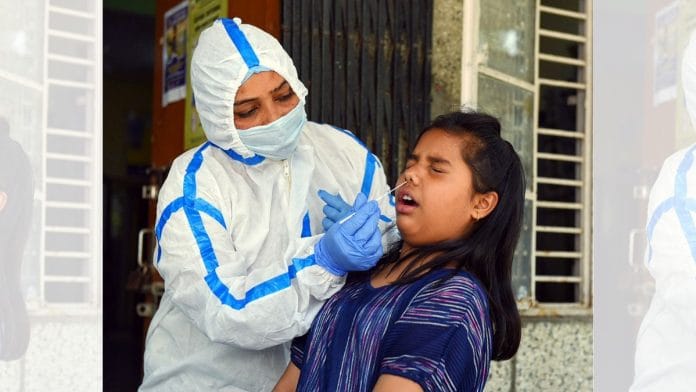Pune: Scientists at the National Institute of Virology, India’s top virus research institute, have said none of the COVID-19 virus strains in circulation currently are showing more disease severity compared to the Omicron lineages predominant earlier.
Since mid-April, when COVID-19 cases started showing a mild spike after a lull of several months, nearly 450 samples collected from COVID-19 patients across India have been subjected to whole genome sequencing at the Pune-based Indian Council of Medical Research-National Institute of Virology (ICMR-NIV).
“These included samples from many of the patients who had died and had been found positive with COVID-19,” a senior scientist told ThePrint. At least 110 COVID-19-related deaths have been reported since January.
“But the strains found in these samples were the same that are causing mild diseases in most others, suggesting that, like previous Omicron variants of the virus, the clinical profile of the current sub-variants has also not changed much,” the scientist explained.
In the second week of April, there was an upsurge of COVID-19 cases in India, following a spike in several other Asian countries, including Singapore, China and Malaysia.
Genomic analysis revealed that the surge was due to the JN.1.16 sublineage of the Omicron variant of SARS-CoV-2—the virus that causes COVID-19— and, since May this year, it was replaced by the XFG (LF.7 and LP.81.2) recombinant variant, NIV director Dr. Naveen Kumar said Wednesday, in an interaction with the press.
The Omicron variant was responsible for the third major wave of COVID-19 that started in late 2021. Various sub-lineages of this variant have emerged since, but despite showing adaptability for faster transmission between people, they mostly cause only an upper respiratory infection.
Dr. Kumar said the virus isolation of the newer variants was in process at the institute, and the effort would be helpful in assessing vaccine effectiveness and supporting India’s indigenous efforts for vaccine development.
There has been no change in hospitalisation pattern despite the surge, he also emphasised, highlighting that, following a brief rise in active cases, cases have now started going down.
According to the latest data by the Ministry of Health and Family Welfare, India’s active COVID-19 caseload on 18 June declined to 6,483 from 6,836 the previous day.
Four deaths were recorded in the past 24 hours. Of the four deaths, two were reported in Maharashtra, while Kerala and Delhi reported one each.
All four individuals were elderly and had existing respiratory ailments and other chronic conditions. Experts say the deaths could be a result of COVID-19 exacerbating their underlying conditions.
Sources also said the Union health ministry was in the process carrying out audits of the over 110 COVID-19 deaths reported this year.
(Edited by Sanya Mathur)
Also Read: How Serum Institute, DNDi tie-up for affordable antibody will bolster global fight against dengue






